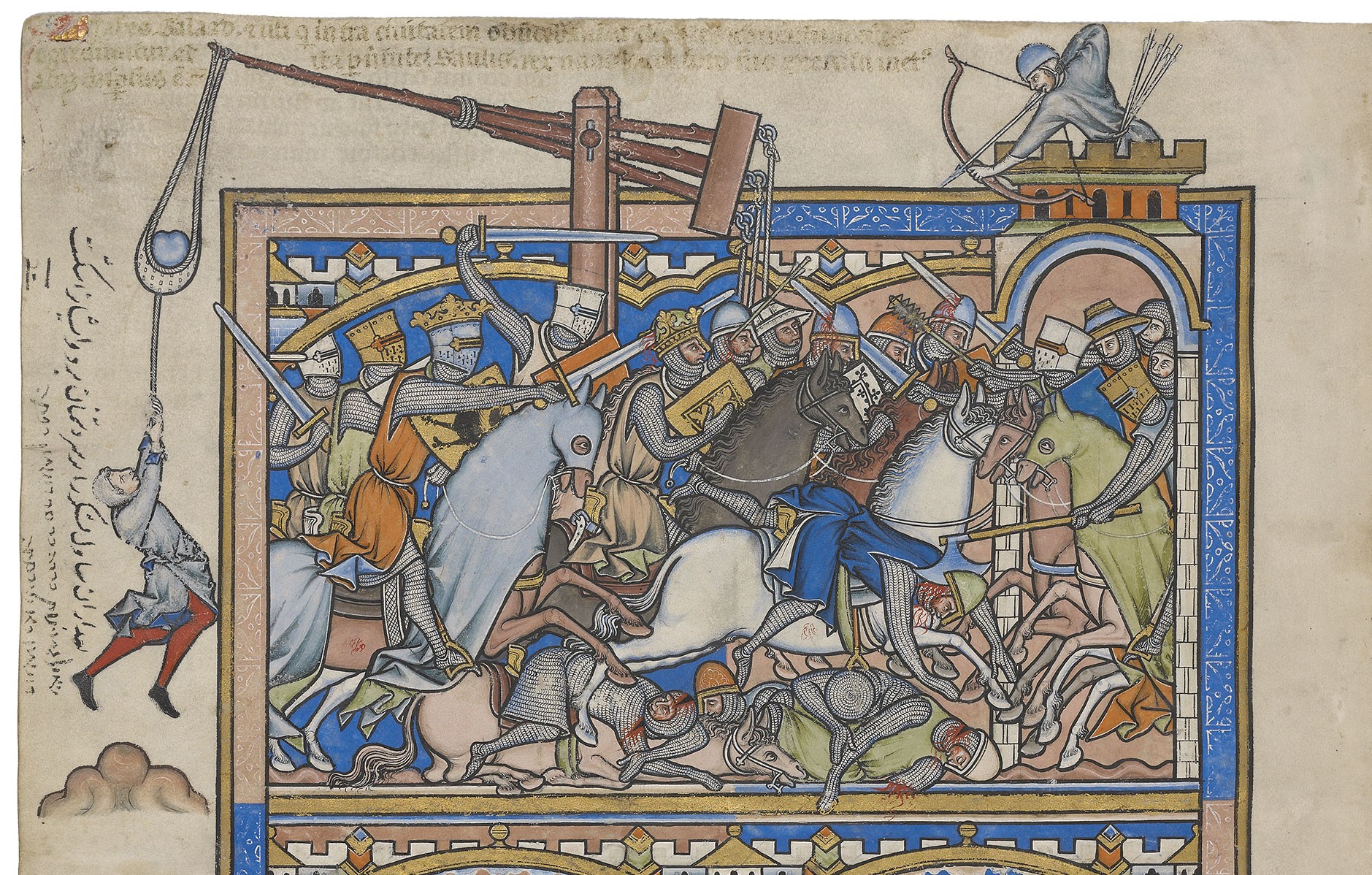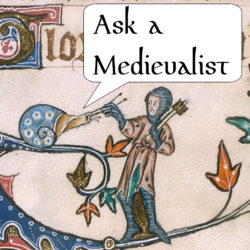Summary:
Em and Jesse discuss the inspiration behind the podcast and try to answer a few questions: What are the Middle Ages? How are they different from the Dark Age? Where did the name “Middle Ages” come from? Why study the Middle Ages? Also, Jesse makes controversial claims about Christopher Marlowe’s play Doctor Faustus.
Notes, Corrections, and Citations:
1/ This is the comic referenced.
2/ Neil Gaiman (esp. Sandman) / Reading Rainbow. This was a Twitter Thing (actual tweets can be seen here)…here’s an older podcast LeVar Burton did reading a Neil Gaiman story called “Chivalry.” It looks like he did livestream “We Can Get Them for You Wholesale,” but I don’t see the actual recording–maybe it didn’t get archived?
3/ John Dee: Professional weirdo. Ben Jonson did have a book of Dee’s; it is called Liber Iuratus Honorii [usually translated as “the sworn book of Honorius”]. Here is the catalog entry, courtesy of Dr. Kate Mesler.
4/Marlow’s Dr Faustus–was it secretly about John Dee? Probably not. Dee probably didn’t have this reputation yet (i.e., super powerful and/or evil), and anyway he was abroad in Europe when Marlowe wrote his play. Also, Faustus was a real guy who died around 1541. His legend was already spreading in chapbooks by the 1580s, and there was an English translation by 1588. Marlowe wrote his play between 1589-1592, clearly based on the legend of Faust.
5/ Ben Jonson’s The Alchemist–Jonson ended up with one of Dee’s books, so he certainly knew about him. Also, Dee had probably just died (with his reputation in tatters) when Jonson wrote the play, so–it’s not impossible that Jonson had Dee on his mind when writing the play.
6/ Geoffrey Chaucer: I’m not going to say he’s a big deal, but if you know of one person from the Middle Ages, it’s probably him.
7/ Rocca Paolina https://en.wikipedia.org/wiki/Rocca_Paolina Jesse got the timeline of the discovery/excavation a little off.
8/ Tolkien
9/ Monty Python and the Holy Grail / Terry Jones. Terry Jones died in January 2020. Because of his fame in other arenas, it’s actually quite difficult to find a bibliography of his medieval works online. A few prominent ones are Terry Jones’ Medieval Lives (co-written with Alan Ereira) and Chaucer’s Knight.
10/ Aztalan state park. Aztalan is the name of a city that was founded around 1100 CE. I’m not actually sure how many people lived there–the sources I see note the largest city of the Mississippians during this period was 30,000 people, but that was in Cahokia (IL). Why is it called Aztalan? Because the Aztecs’ origin stories claimed that they had migrated to Mexico from somewhere to the north, and because the site has 1/ earthen pyramids, and 2/ apparently, evidence of cannibalism (this claim doesn’t seem widely repeated, so take it with a grain of salt). There has been significant evidence that the Americas were very much shaped by the Native Americans: example.
11/ The Hungry Woman and Heart of the Earth by Cherrie Moraga.
12/ The Popul Vuh is the Mayan book of creation. There are many translations out there (I own at least two of them somehow) so I won’t link to any specific one. But it’s an interesting read.
13/ There have been a ton of books written about the Spanish conquest of the Americas and the various terrible things they did there. If you are interested specifically in the ways Christianity and native culture interacted, one more interesting book I have read is Inca Bodies and the Body of Christ by Carolyn Dean. (Join in next week for more of my new secret series, Em Recommends Her Grad School Reading List.)
14/ Genghis Khan: If you really want to know about the Mongols, check out the relevant episodes of the Hardcore History podcast as a starting point.
15/ Kublai Khan took the throne in 1260 and ruled until 1294. He was Genghis’s grandson.
16/ Ibn Daniyal: A brief biography with a disappointingly bowdlerized summary of his plays can be found here.
Plays in translation (they are XXX rated): English version, another cheaper English version, Arabic version.
17/ At around 29:40 Jesse asserts that Medieval Theatre is “in many ways” more interesting than Renaissance theatre, and that’s not even the most controversial thing she has alleged in this episode!
18/ ”It’s almost a cliché in certain…time traveling shows…” specifically I was thinking of an episode of Stargate SG-1 (which typically has no time travel in it, sorry). Looks like there were a bunch of scenes where Dr. Daniel Jackson badmouths the Dark Ages, actually. Example. Example.
19/ Miracle Workers: The Dark Ages. I haven’t seen it (neither has Jesse) but apparently it has Daniel Radcliffe in it. And a duck. So.
20/ Blackadder: best show ever? …
21/ Agricola: Spend a good four hours pretending to be a mud farming peasant.
22/ Europa Universalis 4: Spend a thousand hours conquering the globe. It really will teach you a lot of geography. (I definitely haven’t spent a thousand hours playing this, but it is how I learned about a shocking number of kingdoms/countries/sultinates/etc. that existed before the modern era.)
23/ During the discussion of plays, Jesse was unclear. [Sorry about that! Em thought I conflated Mankind and the Ordinalia. This is what happens when I get excited–I talk very, very quickly and skip key details that I forget everyone doesn’t already know. I will work on this for the sake of the podcast! And also my students.-JN] Mankind is a great morality play from East Anglia. The Ordinalia are three Cornish plays: the Origo Mundi (The Origin of the World), a Passion, and a Resurrection. The “world play” refers to the first play, even though usually a “world play” contains the entire history of the world from creation to doomsday (and in this case, even the entire cycle doesn’t include a Doomsday).
24/ Henry VI is a series of three plays by Shakespeare, not to be confused with Henry V (one play, quite good) or Henry IV (two plays, first one is generally thought to be better than the second). Jesse says Henry VII gets the throne back for a year before being killed by Edward IV–this is actually Henry VI!
25/ National Theatre Live: this is probably the link you want.
26/ Mary Shelley wrote during the summer of 1816, which was actually made famously cold by the 1815 eruption of Mt. Tambora (or Tamboro). Krakatoa (also an Indonesian volcano) has erupted many times, but the one everyone thinks of as “the eruption” was in 1883.
27/ It’s also worth noting that Mary Shelley was the daughter of Mary Wollstonecraft, author of A Vindication of the Rights of Women, so the fact that Frankenstein was specifically about man’s hubris is probably not accidental? I don’t know. I wanted to shoehorn that Mary Wollstonecraft fact in because she was awesome and a much overlooked female philosopher.
Podcast: Play in new window | Download

